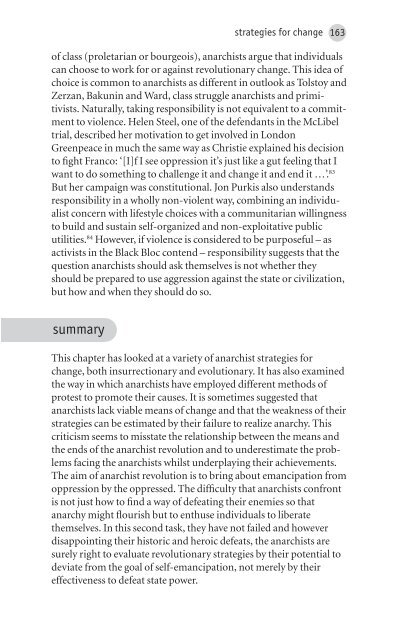o_195qg5dto17o4rbc85q1ge61i84a.pdf
You also want an ePaper? Increase the reach of your titles
YUMPU automatically turns print PDFs into web optimized ePapers that Google loves.
strategies for change 163<br />
of class (proletarian or bourgeois), anarchists argue that individuals<br />
can choose to work for or against revolutionary change. This idea of<br />
choice is common to anarchists as different in outlook as Tolstoy and<br />
Zerzan, Bakunin and Ward, class struggle anarchists and primitivists.<br />
Naturally, taking responsibility is not equivalent to a commitment<br />
to violence. Helen Steel, one of the defendants in the McLibel<br />
trial, described her motivation to get involved in London<br />
Greenpeace in much the same way as Christie explained his decision<br />
to fight Franco: ‘[I]f I see oppression it’s just like a gut feeling that I<br />
want to do something to challenge it and change it and end it …’. 83<br />
But her campaign was constitutional. Jon Purkis also understands<br />
responsibility in a wholly non-violent way, combining an individualist<br />
concern with lifestyle choices with a communitarian willingness<br />
to build and sustain self-organized and non-exploitative public<br />
utilities. 84 However, if violence is considered to be purposeful – as<br />
activists in the Black Bloc contend – responsibility suggests that the<br />
question anarchists should ask themselves is not whether they<br />
should be prepared to use aggression against the state or civilization,<br />
but how and when they should do so.<br />
summary<br />
This chapter has looked at a variety of anarchist strategies for<br />
change, both insurrectionary and evolutionary. It has also examined<br />
the way in which anarchists have employed different methods of<br />
protest to promote their causes. It is sometimes suggested that<br />
anarchists lack viable means of change and that the weakness of their<br />
strategies can be estimated by their failure to realize anarchy. This<br />
criticism seems to misstate the relationship between the means and<br />
the ends of the anarchist revolution and to underestimate the problems<br />
facing the anarchists whilst underplaying their achievements.<br />
The aim of anarchist revolution is to bring about emancipation from<br />
oppression by the oppressed. The difficulty that anarchists confront<br />
is not just how to find a way of defeating their enemies so that<br />
anarchy might flourish but to enthuse individuals to liberate<br />
themselves. In this second task, they have not failed and however<br />
disappointing their historic and heroic defeats, the anarchists are<br />
surely right to evaluate revolutionary strategies by their potential to<br />
deviate from the goal of self-emancipation, not merely by their<br />
effectiveness to defeat state power.




